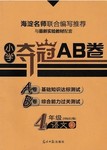题目内容
On two occasions he was accused of stealing money from the company, but in neither case ______ any evidence to support the claims.
A. was there B. there was
C. had there been D. there had been
练习册系列答案
 小学夺冠AB卷系列答案
小学夺冠AB卷系列答案
相关题目
题目内容
On two occasions he was accused of stealing money from the company, but in neither case ______ any evidence to support the claims.
A. was there B. there was
C. had there been D. there had been
 小学夺冠AB卷系列答案
小学夺冠AB卷系列答案